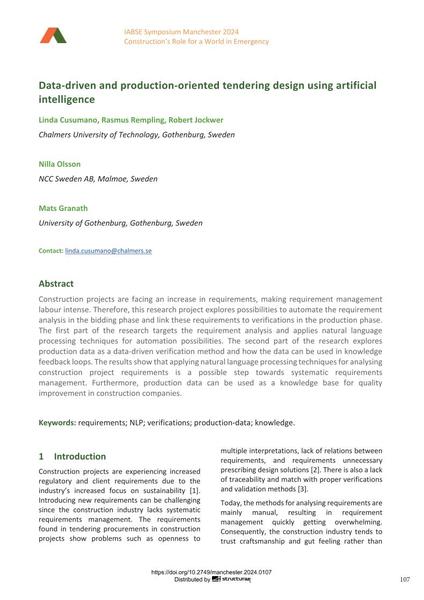Data-driven and production-oriented tendering design using artificial intelligence

|
|
|||||||||||
Détails bibliographiques
| Auteur(s): |
Linda Cusumano
(Chalmers University of Technology, Gothenburg, Sweden)
Rasmus Rempling (Chalmers University of Technology, Gothenburg, Sweden) Robert Jockwer (Chalmers University of Technology, Gothenburg, Sweden) Nilla Olsson (NCC Sweden AB, Malmoe, Sweden) Mats Granath (University of Gothenburg, Gothenburg, Sweden) |
||||
|---|---|---|---|---|---|
| Médium: | papier de conférence | ||||
| Langue(s): | anglais | ||||
| Conférence: | IABSE Symposium: Construction’s Role for a World in Emergency, Manchester, United Kingdom, 10-14 April 2024 | ||||
| Publié dans: | IABSE Symposium Manchester 2024 | ||||
|
|||||
| Page(s): | 107-114 | ||||
| Nombre total de pages (du PDF): | 8 | ||||
| DOI: | 10.2749/manchester.2024.0107 | ||||
| Abstrait: |
Construction projects are facing an increase in requirements, making requirement management labour intense. Therefore, this research project explores possibilities to automate the requirement analysis in the bidding phase and link these requirements to verifications in the production phase. The first part of the research targets the requirement analysis and applies natural language processing techniques for automation possibilities. The second part of the research explores production data as a data-driven verification method and how the data can be used in knowledge feedback loops. The results show that applying natural language processing techniques for analysing construction project requirements is a possible step towards systematic requirements management. Furthermore, production data can be used as a knowledge base for quality improvement in construction companies. |
||||
